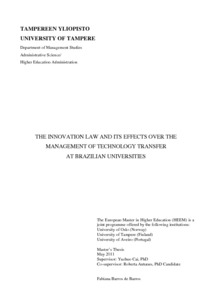The Innovation Law and its Effects over the Management of Technology Transfer at Brazilian Universities
BARROS DE BARROS , FABIANA (2011)
BARROS DE BARROS , FABIANA
2011
Hallintotiede - Administrative Science
Johtamiskorkeakoulu - School of Management
This publication is copyrighted. You may download, display and print it for Your own personal use. Commercial use is prohibited.
Hyväksymispäivämäärä
2011-06-01
Julkaisun pysyvä osoite on
https://urn.fi/urn:nbn:fi:uta-1-21655
https://urn.fi/urn:nbn:fi:uta-1-21655
Tiivistelmä
This study is set out to investigate the influence of federal legislation over university management practices at Brazilian Higher Education Institutions (HEI). During the last decade, Brazilian government has taken the decision to boost innovation as a key factor within its long-term developmental agenda. In general terms, innovation is related to the ability to apply knowledge in the development and production of (new or enhanced) goods and services. Innovation is then closely related to the science and technology performed by skilled individuals such as that carried out at universities. In Brazil, universities are highly recognised for the size and quality of their academic output however the translation of these results for the benefit of society at large is still considered to be weak.
As the country strives to build a sound national innovation system, a new policy framework has been introduced. Within this framework new incentives and mechanisms were created with the aim to foster innovation through various channels and at different levels. The Innovation Law (IL) is one of these mechanisms. Passed in 2004, it recognizes the pivotal role played by universities as powerful research centres and the producers of highly skilled human resources. Among other provisions, aimed at actors such as individual inventors and business enterprises, the IL directly addresses universities by allowing (and legalising) new collaborative modes and requiring the provision of support services for the promotion of technology transfer and the commercialisation of research results. For instance, public universities are mandatorily required to establish a dedicated structure (named NIT) in charge of implementing the institutional innovation policy.
Based on this ongoing process, this study aims to explore how this new policy framework is promoting a change on university management and specifically how institutions with different profiles are implementing that. For the purpose of understanding these dynamics a multiple-case study methodology was adopted. Four universities were selected aiming at showcasing four different institutional profiles. The data collection methods used included documents (such as policy documents, institutional regulations and reports, etc) and phone interviews with the target group constituted of key university managers in charge of technology transfer offices (NIT).
The findings of the study reveal that the state is having a key role in promoting innovation in the Brazil through the introduction of a favourable policy framework and funding mechanisms. Nevertheless, there is still many deficiencies identified that are preventing the institutionalisation of IL provisions. Some of these barriers are related to the gaps and conflicts in the legislation itself. More importantly, are highlighted the achievements and barriers at the institutional level that indicate how this change process is taking place and affecting university management.
A key conclusion reached is that the improvement and professionalization of university research management is a key issue if Brazil wants to fully harness academic science and technology potential for development.
Key words: Technology transfer, technological innovation, Brazil, Innovation Law, University-Industry relations, research management
As the country strives to build a sound national innovation system, a new policy framework has been introduced. Within this framework new incentives and mechanisms were created with the aim to foster innovation through various channels and at different levels. The Innovation Law (IL) is one of these mechanisms. Passed in 2004, it recognizes the pivotal role played by universities as powerful research centres and the producers of highly skilled human resources. Among other provisions, aimed at actors such as individual inventors and business enterprises, the IL directly addresses universities by allowing (and legalising) new collaborative modes and requiring the provision of support services for the promotion of technology transfer and the commercialisation of research results. For instance, public universities are mandatorily required to establish a dedicated structure (named NIT) in charge of implementing the institutional innovation policy.
Based on this ongoing process, this study aims to explore how this new policy framework is promoting a change on university management and specifically how institutions with different profiles are implementing that. For the purpose of understanding these dynamics a multiple-case study methodology was adopted. Four universities were selected aiming at showcasing four different institutional profiles. The data collection methods used included documents (such as policy documents, institutional regulations and reports, etc) and phone interviews with the target group constituted of key university managers in charge of technology transfer offices (NIT).
The findings of the study reveal that the state is having a key role in promoting innovation in the Brazil through the introduction of a favourable policy framework and funding mechanisms. Nevertheless, there is still many deficiencies identified that are preventing the institutionalisation of IL provisions. Some of these barriers are related to the gaps and conflicts in the legislation itself. More importantly, are highlighted the achievements and barriers at the institutional level that indicate how this change process is taking place and affecting university management.
A key conclusion reached is that the improvement and professionalization of university research management is a key issue if Brazil wants to fully harness academic science and technology potential for development.
Key words: Technology transfer, technological innovation, Brazil, Innovation Law, University-Industry relations, research management
